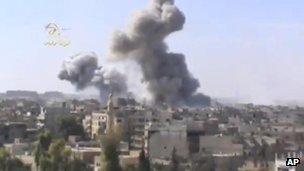Syria rebels 'capture oilfield' in Deir Ezzor
- Published

Syrian rebels have captured a key oilfield in eastern Deir Ezzor province, activists say, after a siege lasting several days.
The Syrian Observatory for Human Rights group said al-Ward fell after fierce fighting, although the reports have not been independently confirmed.
The Observatory said it was the first time the rebels had taken control of an oilfield.
The news came as various opposition groups met for crucial talks in Qatar.
Also on Sunday, the International Committee of the Red Cross (ICRC) said in a statement that on Saturday it had managed to deliver assistance to people in neighbourhoods of the flashpoint city of Homs for the first time in months.
"We have entered Homs on several occasions in recent months, but this is the first time that we have been able to reach the neighbourhoods of Khalidiya and Hamidiya in the Old City," said Marianne Gasser, head of the ICRC's delegation in Syria.
The ICRC said it was able to deliver medical items for the treatment of up to 100 wounded people, and food and hygiene items for more than 1,200 people.
Sanctions
The head of the UK-based Observatory, Rami Abdel Rahman, said: "Rebels in the Jaafar Tayyar Brigade took control of al-Ward oilfield, east of the town of Mayadin, after a siege that lasted several days."
The Observatory also cited witnesses, residents and activists as saying rebels had shot down a warplane that had been carrying out attacks on Mayadin.
The Observatory is one of the most prominent organisations documenting and reporting incidents and casualties in the Syrian conflict. The group says its reports are impartial, though its information cannot be independently verified.
Mr Rahman said some 40 troops guarding the oilfield had been killed, wounded or captured.
One activist in the area, Omar Abu Leila, told Associated Press news agency the field was still working until shortly before it was captured.
Al-Ward is said to be one of the most important oilfields in Deir Ezzor, which holds most of Syria's energy reserves.
Oil was the main source of hard currency for the government of President Bashar al-Assad until the European Union - which had bought 95% of Syria's output - imposed sanctions last year.
Oil exports fell to 7,500 tonnes in the first quarter of 2012 from 13,500 tonnes in the fourth quarter of 2011.
Elsewhere in Syria on Sunday, state television said a bomb had exploded near the Dama Rose hotel in Damascus, wounding several people.
The pro-government Ikhbariyeh TV said the explosion was also near the government Labour Union building.
Union leader Mohammad Azouz told Associated Press at least 12 union members were hurt, two critically.
Other clashes were also reported in Damascus, Aleppo, Idlib, Taftanaz and Daraa.
State TV said a leading member of the ruling Baath party in north-east Raqqa province had been killed by gunmen.
Government in exile
Meanwhile, Syrian opposition groups gathered in the Qatari capital, Doha, for a key meeting on how to form a more united front against President Assad.
The meeting could reshape the Syrian National Council (SNC), the main opposition, into a possible government in exile.
The SNC is looking to broaden its ranks and agree on a common platform at the conference, the BBC's Jim Muir reports from Doha.
The SNC will be holding four days of intensive internal meetings aimed at overhauling its structures completely, our correspondent says, bringing in new, young elements closer to events on the ground, and producing a new leadership.
After that it is scheduled to hold talks on Thursday with the Syrian National Initiative, a group of influential and respected opposition figures who are proposing the creation of a unified leadership body that would later produce a government in exile, possibly as early as next month.
Respected dissident Riad Seif is apparently being suggested by the US as the head of the new government in exile.
However, Mr Seif told Agence France-Presse he had no plans to be leader.
"I shall not be a candidate to lead a government in exile... I am 66 and have health problems," he said.
The US is hoping the new leadership will help bring a successful conclusion to an uprising that has killed more than 36,000 people since protests against President Assad erupted in March 2011.
Representatives at Doha will include various other religious and secular groupings, plus Kurdish figures and dissident members of Mr Assad's Alawite sect.